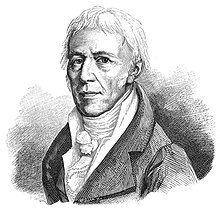Jean-Baptiste de Lamarck
| Jean-Baptiste Lamarck | |
|---|---|

Portrait of Jean-Baptiste Lamarck
|
|
| Born |
1 August 1744 Bazentin, Picardy, France |
| Died | 18 December 1829 (aged 85) Paris, France |
| Citizenship | French Citizen/Subject |
| Nationality | French |
| Institutions | French Academy of Sciences; Muséum national d'Histoire naturelle; Jardin des Plantes |
| Known for | Evolution; inheritance of acquired characteristics; Philosophie Zoologique |
| Influenced | Étienne Geoffroy Saint-Hilaire, William Healey Dall |
| Author abbrev. (botany) | Lam. |
| Author abbrev. (zoology) | Lamarck |
Jean-Baptiste Pierre Antoine de Monet, Chevalier de Lamarck (1 August 1744 – 18 December 1829), often known simply as Lamarck (/ləˈmɑːrk/;French: [lamaʁk]), was a French naturalist. He was a soldier, biologist, academic, and an early proponent of the idea that evolution occurred and proceeded in accordance with natural laws. He gave the term biology a broader meaning by coining the term for special sciences, chemistry, meteorology, geology, and botany-zoology.
Lamarck fought in the Pomeranian War (1757–62) with Prussia, and was awarded a commission for bravery on the battlefield. At his post in Monaco, Lamarck became interested in natural history and resolved to study medicine. He retired from the army after being injured in 1766, and returned to his medical studies. Lamarck developed a particular interest in botany, and later, after he published the three-volume work Flore françoise (1778), he gained membership of the French Academy of Sciences in 1779. Lamarck became involved in the Jardin des Plantes and was appointed to the Chair of Botany in 1788. When the Muséum national d'Histoire naturelle was founded in 1793, Lamarck was appointed as a professor of zoology.
...
Wikipedia
